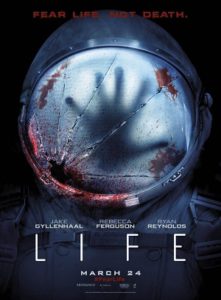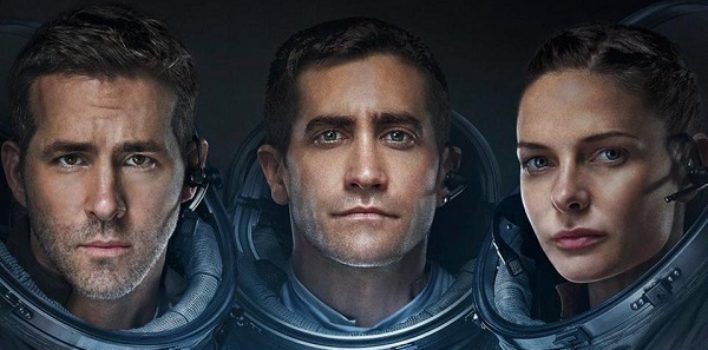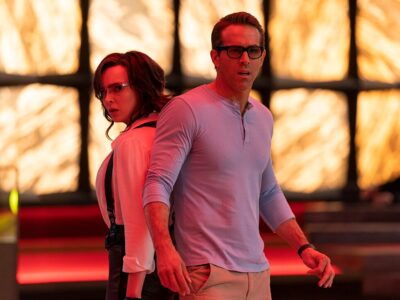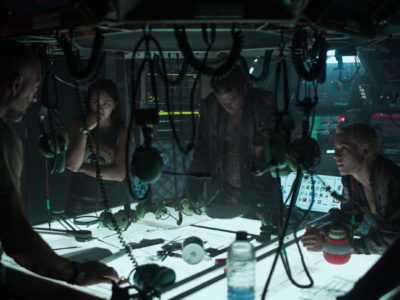Review| Life
 Daniel Espinosa’s Life serves as a mostly solid sci-fi thriller using a terrific (although typical) premise with a solid cast to deliver on the jump-scares and horror elements. A small craft housing samples from Mars is in danger of being lost in space while carrying the hope of the first extraterrestrial life-form. A team of scientists and astronauts on board the International Space Station are charged with retrieving these samples, and investigating the possibility of life. The rest of the film goes the way you might expect it to go when re-animating alien life on an isolated spacecraft. Unfortunately a mixing of messages in a somewhat predictable and entirely unfulfilling conclusion ultimately drops the ball.
Daniel Espinosa’s Life serves as a mostly solid sci-fi thriller using a terrific (although typical) premise with a solid cast to deliver on the jump-scares and horror elements. A small craft housing samples from Mars is in danger of being lost in space while carrying the hope of the first extraterrestrial life-form. A team of scientists and astronauts on board the International Space Station are charged with retrieving these samples, and investigating the possibility of life. The rest of the film goes the way you might expect it to go when re-animating alien life on an isolated spacecraft. Unfortunately a mixing of messages in a somewhat predictable and entirely unfulfilling conclusion ultimately drops the ball.
The film espoused two contrary themes running throughout; one of hope and one of fatalism. Hope sprung joyously with life in the beginning of the film. The birth of a child on earth contrasted with the animation of life in the laboratory on board the space station painted a satisfying picture of the excitement that comes with new life. Part of it is the unknown of the new life. Who will this child become? What will this alien become? Part of it is the instant attachment to new life. The father of the child holds his digital device showing the delivery and newborn images of his son as though like he’s holding his son in person. The scientist who re-animates the Mars sample begins speaking to it as a pet, as a member of the family, as someone for whom he cares. This confusion of a laboratory sample with something like a human life begins to cause problems of carelessness, eventually leading to disaster.
 As the story unfolds and the alien life becomes deadly, the hope for life becomes equivocal with a hope for survival as one by one our crew members are killed by “Calvin”. Calvin, of course named via a popular vote back on earth, as it turns out doesn’t respond well to being electrocuted. Who would’ve thought? As a side note, this is one of the films primary points of disconnect with reality because obviously if an alien species from Mars were to be named through a popular vote, Marsy McMars-face would be the clear winner. But I digress… plans to kill Calvin are coordinated with plans for the survival of the remaining crew until eventually we’re down to the last two; David (Jake Gyllenhaal) and Miranda (Rebecca Ferguson). One must kill Calvin on board one evacuation ship while the other can go back to earth. This is where the fatalism comes in.
As the story unfolds and the alien life becomes deadly, the hope for life becomes equivocal with a hope for survival as one by one our crew members are killed by “Calvin”. Calvin, of course named via a popular vote back on earth, as it turns out doesn’t respond well to being electrocuted. Who would’ve thought? As a side note, this is one of the films primary points of disconnect with reality because obviously if an alien species from Mars were to be named through a popular vote, Marsy McMars-face would be the clear winner. But I digress… plans to kill Calvin are coordinated with plans for the survival of the remaining crew until eventually we’re down to the last two; David (Jake Gyllenhaal) and Miranda (Rebecca Ferguson). One must kill Calvin on board one evacuation ship while the other can go back to earth. This is where the fatalism comes in.
Previously in the film some time is spent focusing on David’s record-setting time spent in space and its effect on him. Before Calvin becomes a killer, David reveals to his captain that he likes it in space. He doesn’t want to be “down there” where people do horrible things to each other. No further background is given, so as an audience we’re expected to be on board with this general belief/claim about humanity; we’re better off isolated in space than among each other. The interesting twist comes when it is David that volunteers to essentially save humanity and invite Calvin on board his evacuation capsule and head out to deep space while Miranda returns to earth. He even pleads with Miranda to trust him, he can do it. So David, despite his feelings about humanity and our fallen state in general, embodies the hope for life running from character to character even though he himself will die. This is a terrific picture of sacrifice. It’s a terrific “Jesus image” in that Jesus died for us all despite our sin and rebellious nature against God, and David is willing to die to save humanity from Calvin making it to earth. Too bad that’s not actually what happens.
 The film ends with a capsule landing safely in the sea, and local fishers bringing their boats over to help. They peer in to find David, still alive, surrounded by Calvin, as the fishermen open the capsule and the camera pans out from a top-down view. A few seconds of Miranda screaming as her capsule catapults aimlessly into space are all that follows. Now here’s the question; is such a conclusion intentional for the hopes of a sequel and the sparking of a modern-day Alien type franchise, or is there a message ringing out? For me it was the latter, as I can’t imagine a film like this expecting a sequel, and the reoccurrences of fatalism never being fully extinguished. In the end, humanity deserves Calvin, and who better to deliver him to them than one who seeks separation from humanity and all their ruthless, violent tendencies. Calvin is on earth because we cannot save ourselves and because of our sin we deserve him. While this clashes with the hope and joy of life prevalent in the beginning of the film, this appears to be a decidedly Christian message, minus all the ACTUAL savior stuff. Maybe there is hope for a sequel after all.
The film ends with a capsule landing safely in the sea, and local fishers bringing their boats over to help. They peer in to find David, still alive, surrounded by Calvin, as the fishermen open the capsule and the camera pans out from a top-down view. A few seconds of Miranda screaming as her capsule catapults aimlessly into space are all that follows. Now here’s the question; is such a conclusion intentional for the hopes of a sequel and the sparking of a modern-day Alien type franchise, or is there a message ringing out? For me it was the latter, as I can’t imagine a film like this expecting a sequel, and the reoccurrences of fatalism never being fully extinguished. In the end, humanity deserves Calvin, and who better to deliver him to them than one who seeks separation from humanity and all their ruthless, violent tendencies. Calvin is on earth because we cannot save ourselves and because of our sin we deserve him. While this clashes with the hope and joy of life prevalent in the beginning of the film, this appears to be a decidedly Christian message, minus all the ACTUAL savior stuff. Maybe there is hope for a sequel after all.







